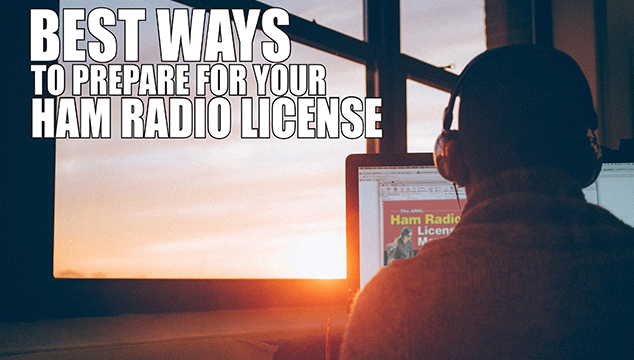
There are three levels of ham radio license that you can now obtain. They’re Technician, General, and Amateur Extra, often just called Extra. The Technician exam consists of 35 questions from a pool of 426 questions that’s broken down into 10 sub-elements or topics. You must get 26 out of 35 correct to pass. The question pool is developed by hams and coordinated by the National Conference of Volunteer Examiner Coordinators (NCVEC). The NCVEC is comprised of the 14 Volunteer Exam Coordinators (VEC) that have an agreement with the Federal Communications Commission (FCC) to conduct licensing exams. Each question pool is valid for four years, with the current one valid until June 30th, 2018. There is no longer a morse code test requirement for any level of ham license.
There are numerous ways you can study for your Technician test. Many of the resources on the web and smartphone apps are free for the Technician level. What resources you choose to use will depend on how your learning style.
Books
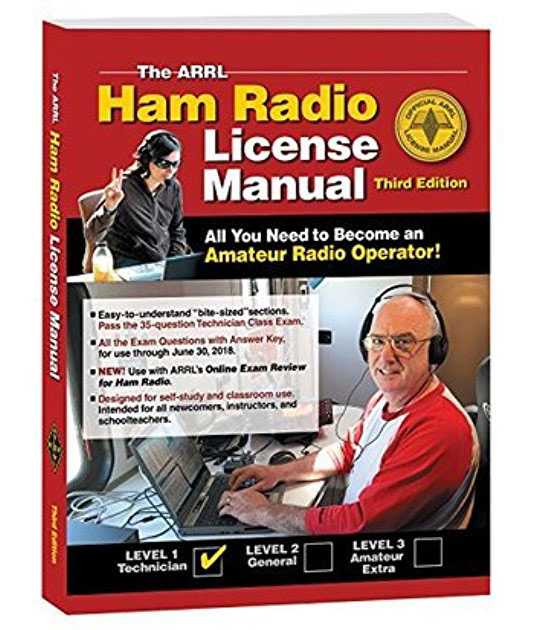
Probably the most well-known is the ARRL Ham Radio License Manual. It’s available in the traditional binding or with a spiral binding, which is probably easier to use. The ARRL manuals thoroughly explains the materials. They provide a copy of the question pool in the back, together with a cross reference to the appropriate chapter. This book is good if you want a thorough, and perhaps more in-depth, understanding of the topic/concept.
Even if you don’t use this book as your primary study tool, it’s good as a reference. There are many operating aspects that aren’t tested on in the Technician exam but you need to know in order to get on the air.
Another very popular study guide that has been around as long as ARRL are the Gordon West, WB6NOA, manuals. Gordon’s format provides the question as it’s written in the question pool, together with four different answers. He then indicates the correct answer. It also provides an explanation as to why that answer is correct or why the others are wrong.
The books come with a CD which has audio of the questions, so you can study while driving.
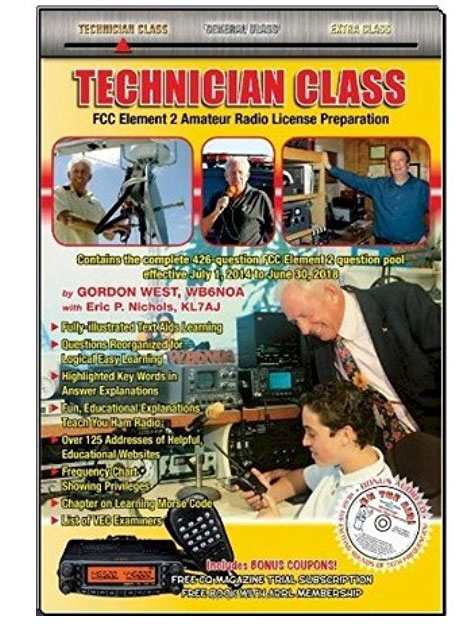
Gordon has been conducting licensing classes for over 40 years so his manual is tried and tested. There is additional material on his website www.gordonwestradioschool.com to check out. It includes classes by approved instructors, most of who are in California. The books and other materials are produced in cooperation with the W5YI VEC.
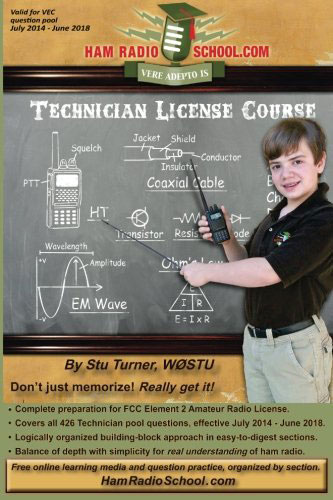
Gordon also provides his instructional slides with the questions following each section free to instructors.
The Stu Turner, W0STU, books provide a short sentence or two on a topic and the key words are highlighted. He has a companion website, www.hamradioschool.com. There are additional materials to accompany the book as well as quizzes for each chapter. His site also has a number of articles of interest to hams. It includes product reviews and more in-depth explanations of some topics such as spread spectrum.
Stu also has apps, through Peak Programming, LLC, for both iOS and Android devices. The apps allow you to review the questions and take practice exams.
Craig Buck, K4IA, recently came out with a series of study books. These are written on the premise that when reading you only see the right answer. Therefore, this means you don’t have to remember which of the four options on the exam is the right one. You’ll only recognize the correct one out of the four.
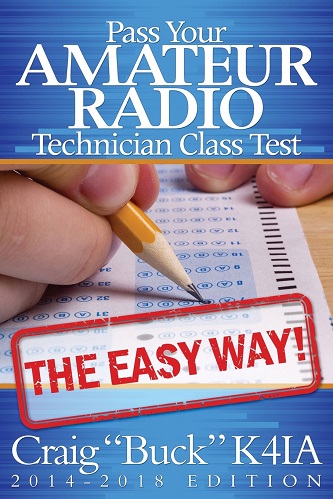
All of the books mentioned above are available through Amazon (click the image for the Amazon link). I would suggest that if you have a Ham Radio Outlet (HRO) or other store nearby that you go look. Then you can determine which one best suits your study style.
Dan Romanchik, KB6NU, has been producing study guides for years. While they’re available through Amazon in a paperback form, he is better known for his website. You can download the Technician material as a free pdf. They’re also available in Amazon Kindle, Barnes & Noble Nook versions, paperback through Amazon, and an audiobook. He also has video lessons available on his YouTube channel.
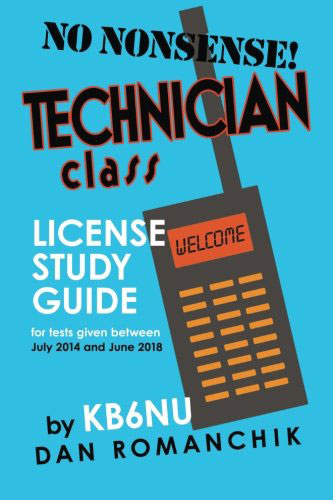
The study guide gives the basic required knowledge in short sections with highlighted keywords and cross references to the question pool number.
Flash Cards
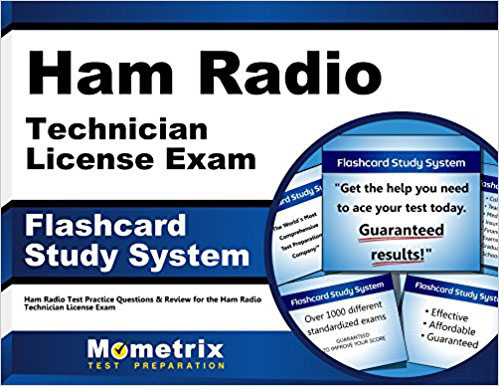
Flash cards are available for all the exams. These have the question on one side and the answer on the reverse. Of course, you can also get some 3×5 index cards and make your own using the question pool. This latter method reinforces your learning while you’re making them. Keep in mind that with a pool of 426 questions for the Technician, it will take you a while to write them yourself.
Apps
In addition to the app by Stu Turner mentioned above there are a number of others available for most operating systems. Many provide free access for the Technician exams. These include Ham Test Prep and HAMEXAM Five by Five. Most of the apps have a flash card option, practice exams, and an option that goes through all the questions or a specific section/topic. They’ll rotate through the questions until you get them correct. The advantage with apps is the repetition and the ability to have it on your phone so you can use it anytime.
Websites and Other Sources
There are quite a few websites that provide study material, flashcards, and other resources.
The ARRL offers practice tests on their site.
AA9PW offers free practice exams for all levels. They also include morse code study material. You can select which sections of the material to do a practice test on or the entire exam.
Hamstudy.org has flashcards and practice exams. You can also read all the questions by section. The questions are displayed in a box with the wrong answers in light gray and the correct one in bold green. You can concentrate on the correct answer and hopefully not be distracted by the incorrect one.
W9PE has a cram course for Technician and provides the slide set for download. This is very similar to some of the abbreviated material that provides just what you need to know, just in a different format.
Hamclass.org is a site that a club has put together for students in their classes. They have a study guide derived from the question pool for Technician that consists of the question and correct answer. There is also a workbook and handout they use for class that can be downloaded for free.
The Patriot VE Team is based in Denver, Colorado and if not from the area indicate you’re looking for study material in the request to join questions. They have General and Extra versions that some of their VE’s created and are available from their Facebook page.
A web search will probably find more sites with study resources. In all cases make sure that the material references the current 2014-2020 test pool for the Technician.
Video Lessons
Dave Casler, KE0OG, has the best video lessons that I’ve found on the web. They’re broken down into topics and most are less than 10 minutes each.
Finding a Class
Various ham clubs offer classes. If the club is affiliated with the ARRL then the class will probably be listed on the website class listing. You should also search the web for local ham clubs and see if they’re offering classes. There are many formats that clubs can choose to do, some are one evening a week, some are weekends. In most cases the classes cover the material in depth as well as the application so you’re not just learning to pass the test.
Passing the test is just the first part. There’s a lot more to operating a radio than what’s explained or covered in the test material. Some groups offer a “Get on the Air” class for new hams. These usually go into the ‘how’ to operate your radio, how to program, and other aspects to make you proficient on the ham bands.
Are You Ready?
Regardless of what method you choose, always test yourself with one of the practice exam apps or web programs. These practice exams will show what material you know and, more importantly, what needs to be studied more. If your scores are consistently 80% or better, you’re ready to take and pass your test. The official test requires 75% to pass.
Finding a Test
Tests are conducted by local teams that are usually part of a ham club that are affiliated with one of 14 VECs. The three largest are ARRL, W5YI, and Laurel Amateur Radio Club. In addition to ARRL affiliated test teams, they’ll list test sessions of non-ARRL affiliated test teams. W5YI provides a list of team leaders in the selected state that you can contact for additional information. The Laurel VEC provides team contact information as well as those test sessions.
The FCC sets a maximum fee of $15 that test teams are allowed to charge for exams. If you pass one exam you can take the next level at no additional charge. If you fail and want to take another exam, then it’s another fee. Not all teams allow a retest on the same day. The Laurel VEC affiliated teams don’t charge for any exams or retests. Some teams use a software program created by the Laurel VEC that helps manage the test session and sends an encrypted file directly to the FCC. This means that new Technicians get their license the next business day. Other teams send paperwork to their VEC and then it’s forwarded to the FCC, a process that regularly takes 10 days or more.
There are those who have the opinion that a license isn’t needed and if something disastrous happens they’ll be able to use a radio. From my experience, it takes those who are new to the hobby some time to fully use their radios effectively and efficiently. There are a lot of free study resources to get your entry level Technician license. It is worth it to take the time to get your license, get involved with a local club, and perfect your skills.
